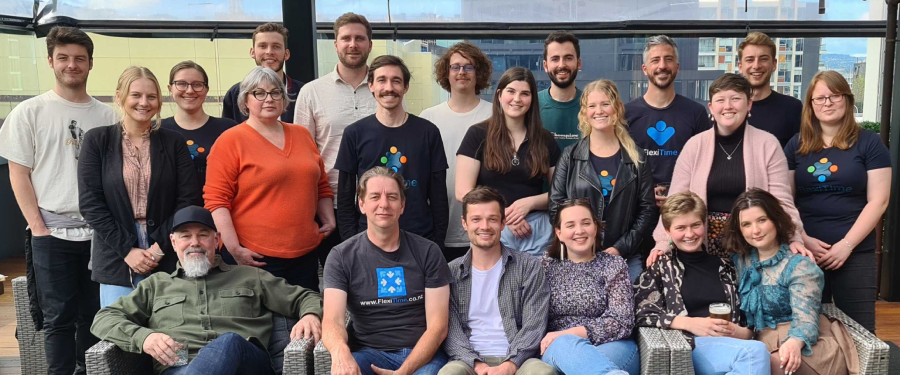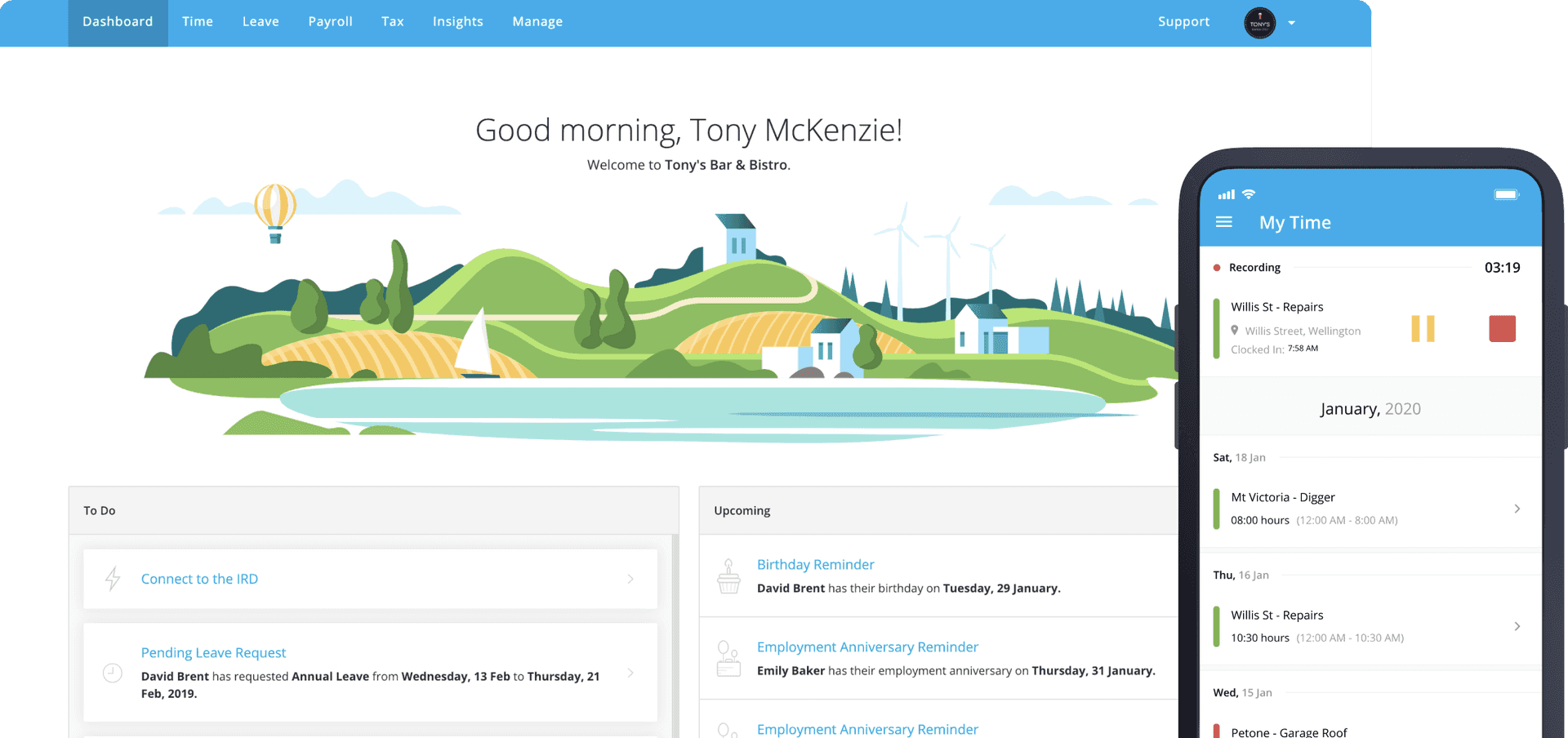Team Management
A Guide to Looking After Your Employees’ Mental Health and Wellbeing
October 10, 2022
8 minutes to read
Let's be honest. Struggles with mental health affect most Kiwis at some point in their life. Stress is a natural reaction to some situations, and can occur at work or home, or a combination of the two. When our tanks start running on empty, everyday tasks become more difficult and it can be a lonely place.
Finding ways to help employees refill their tanks will help them feel more engaged and able to produce their best work. Feeling tired, stressed and anxious stops everyone from being their best at work and home. No surprises there; we are only human. So what can employers do to help?
We've pulled together this guide for employers to understand how to help employees navigate workplace stress and support their employees' wellbeing and mental health in the workplace.
Workplace stress
If you're an employer wondering why you should take work-related stress seriously, the answer is relatively simple.
According to WorkSafe New Zealand, work-related stress can lead to low engagement and productivity.
When it comes to work-related stress, it can often be a result of the working environment. So if you want your team to thrive, take a moment to consider how your workplace environment may affect the state of your employees' mental and emotional wellbeing.
This list from Health Navigator highlights some common causes of work-related stress:
Too large or limited workloads
Poor management styles
Lack of recognition or positive feedback
Lack of health and safety precautions against hazards
Workplace bullying and harassment
Restructuring or changes within the organisation
Unreasonable expectations of working hours
Poor support available for workers
Unresolved conflict in the workplace
As a business owner, you need to look after your mental health so you can support your employees effectively. 39% of small business owners from a study conducted by Xero recognised that their health is negatively impacted by running their business.
When you fly on a plane, the flight attendant tells you to ‘put your oxygen mask on first, before helping others’. You can’t help anyone else survive if you run out of oxygen. It’s the same for business owners. If you don’t look after your mental health, you won’t be able to support your employees.
Prioritising your own mental health will have natural ripple effects throughout your company.

What can you do to support employee mental health in the workplace?
Mental health for employees is as important as physical health when it comes to work performance. Historically, poor physical health was recognised as having a more detrimental impact on work, but in reality, the effects of mental health can be just as significant. When it deteriorates, there is an increased likelihood of burnout and stress.
Employee stress may not be evident to those around them, so employees should be encouraged to let their manager or employer know if they need extra support.
Taking an interest in your employees' lives and maintaining open communication can help you identify when they’re feeling under pressure. Keep an eye on how engaged they are, any physical signs of stress, and their ability to manage their workloads.
If things get beyond a point where you feel able to help, it may be time to consider offering professional support to help employees work through their problems. More on this later.
What if someone needs time off work due to their mental health?
According to NZPPA, “If an employee is stressed to the point where they cannot work, this would be considered sick leave, which is provided under the Holidays Act 2003”.
In compliance with MBIE, if an employee experiences mental health issues that amount to sick leave from work, ordinary sick leave conditions apply. An employer can request proof that an employee is sick once the employee has been sick for three or more consecutive days (this is usually a medical certificate from a doctor or health professional).
The only employer obligation by law is that you must provide a safe working environment, which should include ensuring employees are not harmed by stress caused by the work they undertake.
If an employee requires more than their 10 days of sick leave, Employment New Zealand states this would be up for negotiation between the employer and employee. But as this is not a legal entitlement, the final decision is at the employer's discretion whether additional leave is provided, the length, and whether this is paid or unpaid leave.

Using employee mental health as an asset to your business
When employees are mentally and physically healthy they’re more engaged in their roles, which leads to greater creativity, innovation and problem solving. So much so that according to MBIE, businesses who have invested in building and maintaining good mental wellbeing report higher productivity, sales and customer satisfaction.
New research commissioned by Xero and conducted by NZIER reveals that for every dollar a small business owner invests in company-wide wellbeing initiatives for their staff, they can expect to see a return of up to 12x within a year.
Prioritising your employees' mental health and wellbeing is extremely valuable and can be considered an asset that gives your business a competitive edge in the modern work environment. Healthy workplace culture will make your business more attractive, making recruiting and retaining employees easier.
Top 5 tips to invest in your employees' mental wellbeing
1. Optimise the work culture
The work environment encompasses more than the physical aesthetic. It also includes the workplace culture. While everyone in the workplace can affect the culture of a business, leaders play the most crucial role.
As a business leader, make it a priority to regularly review your work environment and get feedback so you can look at ways to make improvements. If you don't know where to start, you can get external advice from organisations such as Umbrella and HumanKind.
Simple adjustments in job tasks, work schedules, rules and procedures, and social norms, or providing coaching assistance and reviewing performance expectations can be a good start.
2. Encourage open conversations
It's not always easy to encourage these conversations as a leader, but you must practise what you preach. Speaking about wellbeing openly as a team will establish an environment where your staff feel safe speaking up and prioritising their wellbeing.
You can use the CARE framework from Groov to help you check in with your employees.
Check in
Actively Listen
Reassure
Encourage help (if needed)
3. If you can, offer flexible working arrangements
There is no one-size-fits-all approach to creating a positive work environment. However, if your organisation can operate effectively with flexible working arrangements, employees may be able to achieve their best work while fitting it around their other commitments.
Flexibility can include working from home, open door policies, opportunities for team members to socialise, and flexible work hours. Consider trying out different options, if they make sense for your business.
4. Provide training for leaders and employees
Leaders play a crucial role in supporting your business culture. To help your team thrive, provide your leaders with the proper training to support their team. Ensure they understand the science behind leading with a wellbeing lens, and why it's the right thing to do for the business and people.
In addition, equipping your team with the skills to prioritise their wellbeing will help them feel supported, increasing their engagement and quality of work. Businessolver's State of Workplace Empathy found that 92% of employees would be more likely to stay with their job if their bosses showed more empathy.
5. Partner with or invest in an Employee Assistance Program
Employee assistance programmes (EAPs) offer reactive support through professional counselling to help employees with their mental health and wellbeing.
In New Zealand, EAP Services is the leading employee assistance program, but is a world renowned support network dedicated to enhancing staff wellbeing.
According to research commissioned by Xero, investing in employee wellbeing can actually make a business more profitable. Businesses investing in EAP's alone can expect to see a return of up to 5X within a year.
Want to make employee wellbeing an essential part of how you work, lead and connect? Take this short quiz to see how you and your team rate your employee mental health in the workplace. It's a great place to start!

World Mental Health Day
October 10th is World Mental Health Day.
The World Health Organisation recognises World Mental Health Day on October 10 every year, and the global theme in 2022 is ‘Make mental health & well-being for all a global priority’.
You can play your part by strengthening the culture of your workplace to support the mental health and wellbeing of your workforce. With the growing social and economic effects caused by COVID-19 over the past few years, it’s now more important than ever to come together, support each other and lead by example.
This is also a great opportunity for us to be empathetic in our words and actions to all stakeholders at work, including employees, customers, partners and most importantly yourself.
Supporting mental health at FlexiTime
At FlexiTime, we're a small, supportive team who enjoy coming to work, building great products and having fun.
FlexiTime builds workforce management software to help employees and employers achieve Work.Life.Success™, because when work and life are in balance, we all succeed.
FlexiTime's agile environment provides employees with opportunities to learn, develop, and build relationships with teams across the business.
We are also committed to creating a fun work environment with extra benefits, such as tasty coffee, table tennis, darts, Friday team lunches, time away from the office and the occasional beer festival.
To top it all off, FlexiTime embodies a non-judgemental culture, with no stigma around sick leave and flexible work arrangements when possible, emphasising productivity and outwardly supporting staff to prioritise their mental health and wellbeing.






